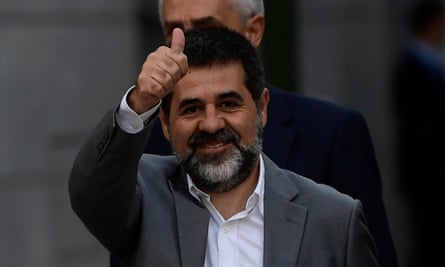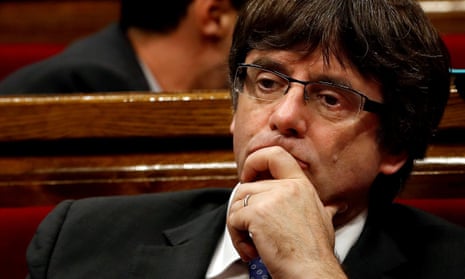The former Catalan president Carles Puigdemont, whose push for regional independence plunged Spain into its worst political crisis for 40 years, has abandoned his attempt to return to office and is stepping aside in favour of a candidate who is currently in prison.
Puigdemont used a 13-minute video shared on social media on Thursday night to confirm reports he was no longer seeking the presidency. He said that “with the greatest sadness” he had informed the speaker of the Catalan parliament that he was unable to retake the post and that an alternative candidate should be chosen.
He added that he had “provisionally” called off his candidacy and was instead proposing Jordi Sànchez, an MP in his Together for Catalonia (JxCat) party and the former leader of the influential grassroots Catalan National Assembly (ANC). “No one represents the values of JxCat better than him and he is a man of peace who is unjustly locked in a Spanish prison,” said Puigdemont.
In a move likely to be seen as the formation of a government in exile, Puigdemont said he was planning to set up a foundation abroad – the Council for the Republic – to promote Catalan independence. “I will not throw in the towel, I will not quit, I will not give up in the face of the illegitimate behaviour of those who lost at the ballot box or the capriciousness of those who are prepared to forfeit the rule of law and justice as the price for national unity,” he said.
“Madrid no longer has any excuse for continuing its occupation policy nor for carrying on ignoring our voice or imposing a colonial vision on our future.”
Puigdemont also revealed that a team of lawyers had lodged a formal complaint about the Spanish state’s actions with the UN human rights committee.
The deposed president denied that there had been any kind of capitulation on the part of the Catalan independence movement, insisting it had now regrouped and was moving to a different battlefield.
Sànchez has been in custody since mid-October, when he and another pro-independence civil society group leader, Jordi Cuixart, were arrested as part of an investigation into alleged sedition in the runup to the regional independence referendum a fortnight earlier.

Both have been accused of using huge demonstrations to try to stop Spanish police officers from following a judge’s orders to halt the vote, which had already been suspended by the country’s constitutional court.
Puigdemont, who fled to Brussels last October after the Catalan parliament made a unilateral declaration of independence, faces arrest on possible charges of sedition, rebellion and misuse of public funds if he returns to Spain. He said: “I’m confident that we will win in the end, and one day I will be able to return to Catalonia as a free man.”
His withdrawal is unlikely to bring a swift end to the stalemate, given Sànchez’s legal predicament and the Spanish government’s insistence that the Catalan parliament put forward a “clean candidate”.
The announcement came hours after the three pro-independence parties in the Catalan parliament approved a motion recognising both the legitimacy of Puigdemont’s candidacy and the results of the referendum. It did not, however, endorse the earlier independence declaration.
Inés Arrimadas, the leader of the unionist Citizens party in Catalonia, said the session had shown that there was “no road map or design for the future for the Catalan people”.
Puigdemont accelerated Catalonia’s collision course with Madrid last June when he announced that an independence referendum would be held in defiance of the Spanish constitution. Although 90% of those who voted in the 1 October poll cast their ballots in favour of independence, only 42% of the region’s voters took part, as pro-unionist Catalans boycotted the referendum.
Almost a month after the vote, which was marred by violence from Spanish riot police, separatist Catalan MPs approved a unilateral declaration of independence.
The Spanish prime minister, Mariano Rajoy, responded by using the constitution to sack Puigdemont and his cabinet, assume direct control of Catalonia and call snap elections. However, the move backfired after the three separatist parties held on to their parliamentary majority.
At the end of January, Puigdemont privately admitted that his bid to achieve independence had failed. In messages to a former colleague that were captured by a TV camera, he said “the [Spanish government’s] plan has won”, adding: “I guess you’ve realised that this is over.”
Amnesty International has called for the release of Sànchez, calling his continuing detention “an excessive and disproportionate restriction on his right to freedom of expression and peaceful assembly”. Lawyers for Sànchez, Cuixart and the former Catalan vice-president Oriol Junqueras are appealing to the United Nations, claiming the men are unlawfully imprisoned.
